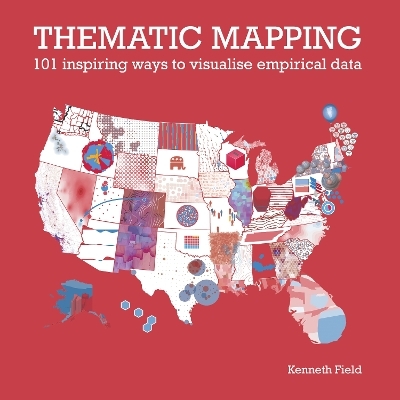
Thematic Mapping
101 Inspiring Ways to Visualise Empirical Data
Seiten
2022
Environmental Systems Research Institute Inc.,U.S. (Verlag)
978-1-58948-557-0 (ISBN)
Environmental Systems Research Institute Inc.,U.S. (Verlag)
978-1-58948-557-0 (ISBN)
Thematic Mapping: 101 Inspiring Ways to Visualise Empirical Data explores the rich diversity of thematic mapping using a single dataset from the 2016 US presidential election.
First place winner in Educational Products at the 2021 International Cartographic Conference
Maps are ubiquitous, yet maps are not made equally, nor are they read equally.
Every map is a product of its maker and its reader, and maps are rarely right or wrong but simply different versions of the truth. The meaning you see in a map can reinforce or challenge your understanding of the theme it represents, and you are much more likely to believe a map if it presents a version of the truth that you believe in already.
But how do you decide what map you want to make? How do you understand the way in which different maps can be used in different ways to tell a story? How do you design a map to be read in a particular way? Thematic Mapping: 101 Inspiring Ways to Visualise Empirical Data answers these questions, and more.
Using 101 maps, graphs, charts, and plots of the 2016 United States presidential election data, Thematic Mapping explores the rich diversity of thematic mapping and the visual representation of data. It details well-known techniques and demonstrates how to design effective maps and graphics. Each map illustrates a different approach to the same data, and all lead to different maps and different ways of seeing different shades of truth.
Thematic Mapping examines the innovative and fascinating alternative ways of making maps of data which you can use in your own work. Which will speak to your truth? -- Ken Field
First place winner in Educational Products at the 2021 International Cartographic Conference
Maps are ubiquitous, yet maps are not made equally, nor are they read equally.
Every map is a product of its maker and its reader, and maps are rarely right or wrong but simply different versions of the truth. The meaning you see in a map can reinforce or challenge your understanding of the theme it represents, and you are much more likely to believe a map if it presents a version of the truth that you believe in already.
But how do you decide what map you want to make? How do you understand the way in which different maps can be used in different ways to tell a story? How do you design a map to be read in a particular way? Thematic Mapping: 101 Inspiring Ways to Visualise Empirical Data answers these questions, and more.
Using 101 maps, graphs, charts, and plots of the 2016 United States presidential election data, Thematic Mapping explores the rich diversity of thematic mapping and the visual representation of data. It details well-known techniques and demonstrates how to design effective maps and graphics. Each map illustrates a different approach to the same data, and all lead to different maps and different ways of seeing different shades of truth.
Thematic Mapping examines the innovative and fascinating alternative ways of making maps of data which you can use in your own work. Which will speak to your truth? -- Ken Field
Dr. Kenneth Field brings a wealth of experience from academia and commercial practice into this book. He is a winner of numerous cartographic awards for his original maps as well as his writing. His first Esri Press book Cartography. (published 2018) won a prestigious International Cartographic Association award for best educational product in 2019. His work has been recognized by numerous peer-reviewed bodies for its quality. Ken is active in a wide range of societies and external bodies, and he continues to write and edit books, journals, and papers, and teach and present keynotes on cartographic design widely.
| Erscheinungsdatum | 27.10.2021 |
|---|---|
| Zusatzinfo | Illustrations |
| Verlagsort | Redlands |
| Sprache | englisch |
| Maße | 254 x 254 mm |
| Themenwelt | Mathematik / Informatik ► Mathematik ► Finanz- / Wirtschaftsmathematik |
| Naturwissenschaften ► Geowissenschaften ► Geografie / Kartografie | |
| Sozialwissenschaften ► Politik / Verwaltung ► Staat / Verwaltung | |
| ISBN-10 | 1-58948-557-2 / 1589485572 |
| ISBN-13 | 978-1-58948-557-0 / 9781589485570 |
| Zustand | Neuware |
| Haben Sie eine Frage zum Produkt? |
Mehr entdecken
aus dem Bereich
aus dem Bereich
eine anwendungsorientierte Einführung
Buch | Softcover (2023)
Springer Gabler (Verlag)
49,99 €
Buch | Softcover (2023)
De Gruyter Oldenbourg (Verlag)
29,95 €


